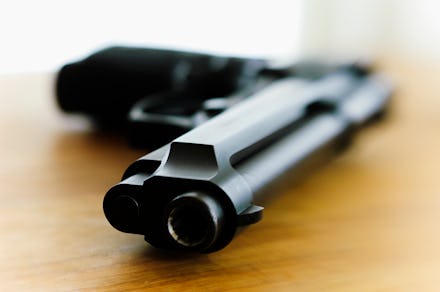Another jarring side effect of coronavirus could be a spike in gun suicides

The COVID-19 pandemic has brought with it a terrible mixture of correlated circumstances that pose additional threats to public health. Social isolation, civil unrest, and deep uncertainty about the future all negatively impact mental health, not to mention the looming threat of potentially fatal viral infection. New research suggests that these risk factors combined with increases in unemployment are warning signs that the impact of COVID-19 may increase the firearm suicide rate in 2020.
A new study conducted by Everytown for Gun Safety, a non profit organization which advocates for gun control, suggests that the economic plunge incited by COVID-19 could contribute to an additional 20 suicides per day, ABC reported. The study analyzed suicide rates during other economically difficult times in American history, like The Great Depression of the 1930s and the Great Recession in 2010. They used data from those periods to predict what we should expect from our current economic situation, and the analysis was not heartening.
This projection equates to an 20-30% increase in the number of deaths by suicide in 2020 — n additional 5,000 to 7,000 lives lost. Because there is no way to actually predict the future, these numbers can only be seen as an estimate. "Similarities to prior eras may provide some insights into what to expect, but history does not always dictate the future," Jack Rozel, a psychiatrist and professor of law at University of Pittsburgh Medical Center Western Psychiatric Hospital, told ABC.
Still, this data is jarring. Combined with the mounting death toll of COVID-19 itself, it’s becoming clearer that this pandemic is going to affect Americans — especially already vulnerable populations — in many ways that we simply haven’t planned for. But the point of this research is not to add to our collective depression. It’s meant to help guide us towards effective preventative measures. “The quantification of impact provides a more meaningful assessment to help drive policy," John Brownstein, chief innovation officer for the Boston Children's Hospital and a professor of epidemiology at Harvard Medical School, told ABC.
It should be up to policymakers to respond urgently to such grim predictions, and Everytown researchers suggested that public health officials should take steps to minimize the risk of suicide, ABC reported. But if we’ve learned anything during this terrible moment in history, it’s that it’s often up to individuals to protect each other from dire threats. Checking in on our loved ones’ emotional health and helping each other connect with resources is as important as washing your hands and wearing a mask.
If you or someone you love is are struggling with thoughts of suicide, call the National Suicide Prevention Lifeline at 1-800-273-8255 [TALK] for free confidential emotional support 24 hours a day, 7 days a week.